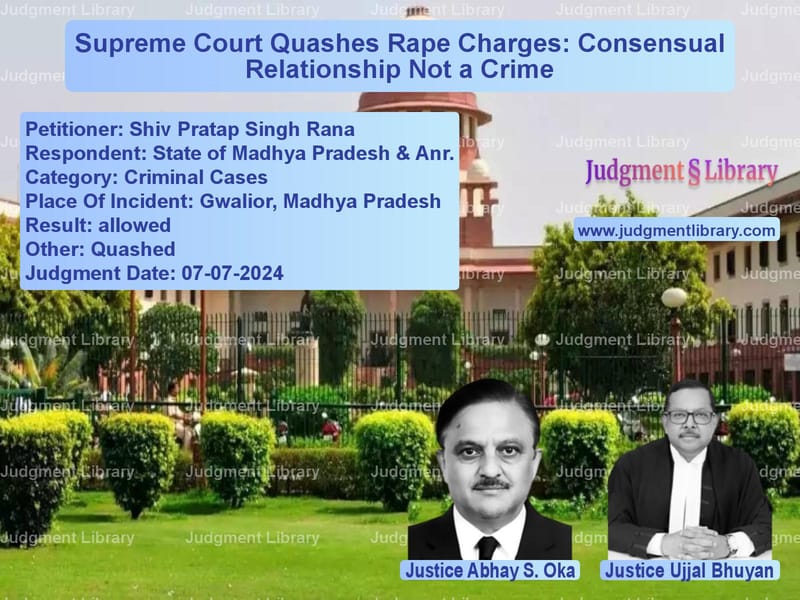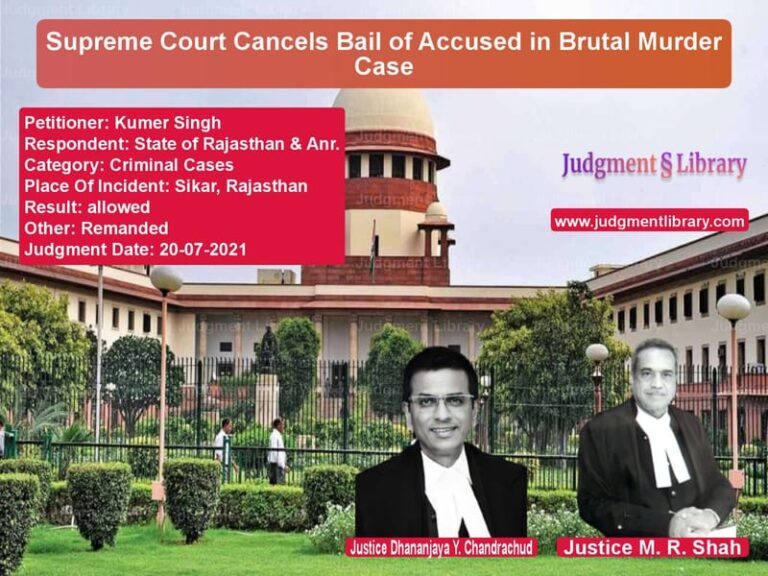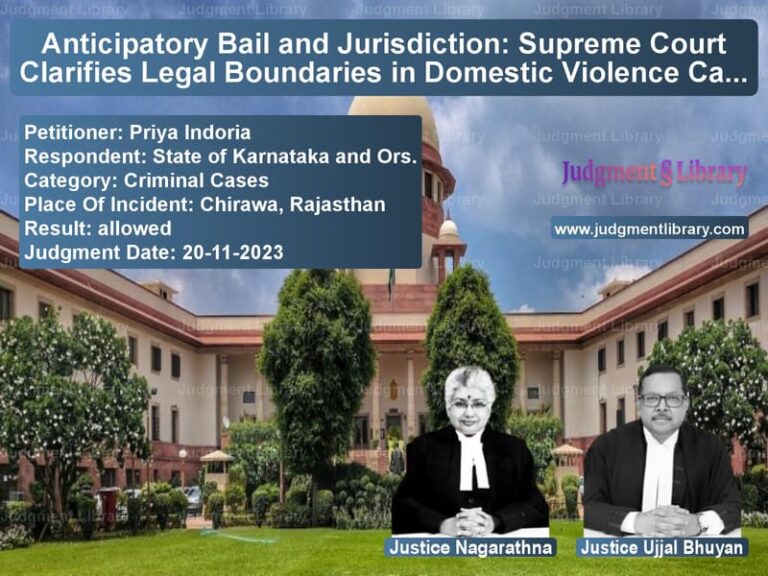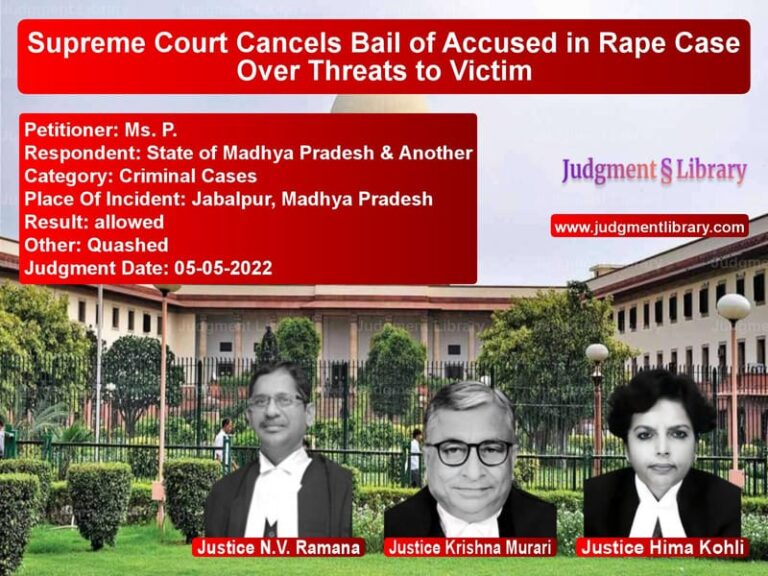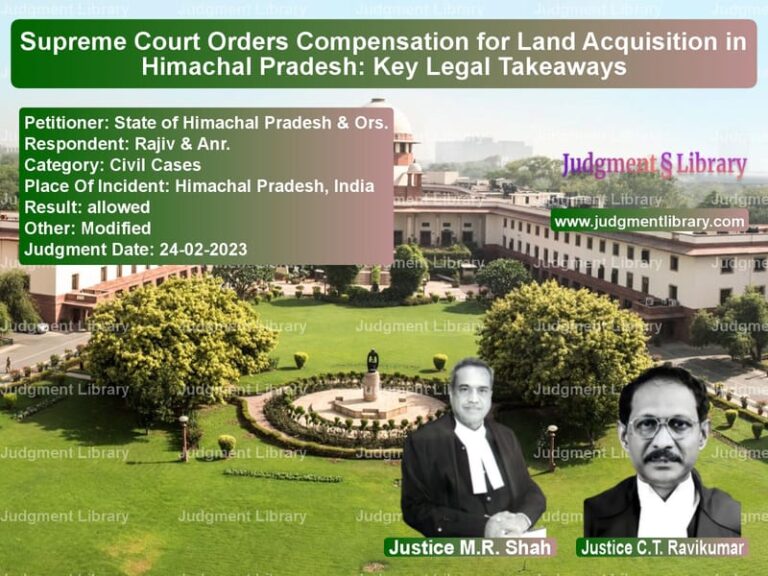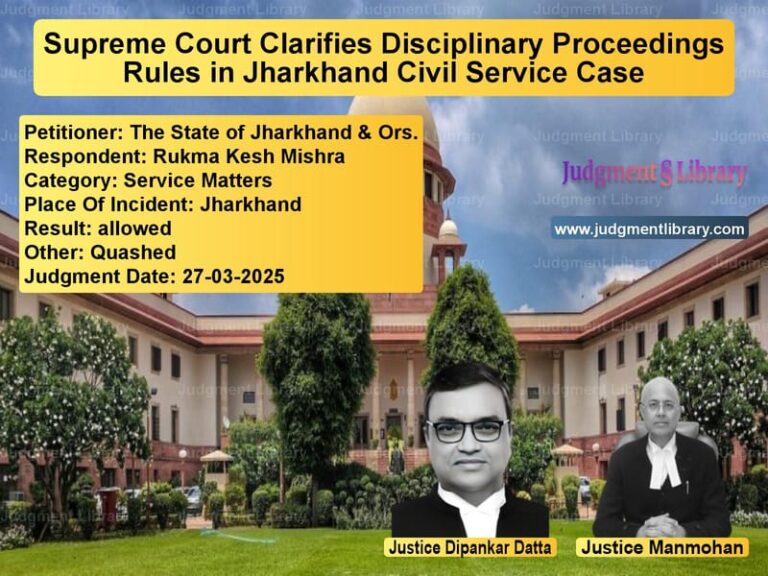Supreme Court Quashes Rape Charges: Consensual Relationship Not a Crime
The case of Shiv Pratap Singh Rana v. State of Madhya Pradesh & Anr. revolves around a criminal appeal challenging the framing of charges under Section 376(2)(n) (repeated rape) and Section 506 (criminal intimidation) of the Indian Penal Code (IPC). The Supreme Court, in its judgment dated July 8, 2024, quashed the proceedings, ruling that the relationship between the appellant and the prosecutrix was consensual and did not amount to rape.
The ruling highlights the legal distinction between consensual relationships and false promises of marriage as grounds for rape charges. The Court emphasized that misleading consent induced by a false promise must be proven beyond doubt, and an unfulfilled promise does not necessarily constitute an offense.
Background of the Case
The appellant was accused of coercing the prosecutrix into a physical relationship under the pretext of marriage. The prosecutrix alleged that the appellant took private photographs of her and threatened to make them public if she did not comply with his demands. She further claimed that he repeatedly assured her of marriage but later retracted, leading her to file an FIR under Sections 376 and 506 IPC.
Key Facts
- The prosecutrix and appellant were in a relationship from 2016 to 2018.
- The prosecutrix alleged that the appellant blackmailed her into a physical relationship by threatening to release private photographs.
- She claimed he made repeated promises of marriage but later refused.
- The prosecutrix lodged an FIR on September 6, 2018.
- The police filed a chargesheet under Sections 376(2)(n) and 506 IPC.
- The Trial Court rejected the appellant’s discharge application.
- The High Court upheld the order, ruling that a prima facie case was made out.
- The Supreme Court stayed the proceedings and later admitted the appeal.
Arguments by the Appellant
The appellant contended:
- The relationship was consensual and lasted nearly two years.
- The prosecutrix was an adult and willingly engaged in the relationship.
- There was no material evidence to support the claim of coercion.
- The allegations were made only after the appellant refused to marry her.
- The police failed to seize any private photographs or incriminating material.
- The FIR was lodged two years after the alleged incidents, raising doubts about its credibility.
Arguments by the Respondent (State)
The prosecution argued:
- The appellant used emotional manipulation and blackmail to exploit the prosecutrix.
- The prosecutrix was deceived into a relationship on a false promise of marriage.
- Repeated sexual relations based on deception amount to rape under Section 376(2)(n) IPC.
- The prosecutrix’s statements under Sections 161 and 164 CrPC supported the allegations.
- The appellant refused to marry the prosecutrix unless her family paid ₹15 lakhs.
Supreme Court’s Observations
The Supreme Court analyzed whether the case warranted a full trial or if it should be quashed at the preliminary stage.
1. Distinction Between False Promise and Consensual Relationship
The Court held that:
“Consent may be express or implied, coerced or misguided, obtained willingly or through deceit. If the consent is given by the complainant under misconception of fact, it is vitiated. Consent for the purpose of Section 375 requires voluntary participation not only after the exercise of intelligence based on knowledge of the significance and moral quality of the act, but also after having fully exercised the choice between resistance and assent.”
The Court emphasized that the prosecutrix was an adult and continued the relationship for two years, making it unlikely that her consent was coerced.
2. Delay in Filing the FIR
The Court noted that the prosecutrix lodged the FIR two years after the alleged incidents, suggesting that the complaint arose out of a failed relationship rather than coercion.
3. Lack of Evidence of Blackmail
The Court found that:
- No private photographs were recovered from the appellant.
- The phone allegedly used to take the photographs was never seized.
- There was no record of monetary transactions between the prosecutrix and the appellant.
The Court ruled:
“In the absence of any corroborative evidence, the prosecutrix’s allegations remain unsubstantiated and do not warrant prosecution.”
4. Legal Interpretation of Consent
The Court referred to Pramod Suryabhan Pawar v. State of Maharashtra (2019), where it was held:
“To establish whether the ‘consent’ was vitiated by a ‘misconception of fact’ arising out of a promise to marry, two propositions must be established. The promise must have been false, given in bad faith and with no intention of being adhered to at the time it was given.”
The Court found no evidence that the appellant had a dishonest intent when making the promise.
Supreme Court’s Final Verdict
The Supreme Court ruled:
- The High Court’s judgment was set aside.
- The Trial Court’s order framing charges was quashed.
- The criminal proceedings against the appellant were terminated.
- The appeal was allowed, clearing the appellant of all charges.
Conclusion
The Supreme Court’s ruling in Shiv Pratap Singh Rana v. State of Madhya Pradesh & Anr. reinforces the principle that consensual relationships do not constitute rape unless deception is clearly established. The judgment sets an important precedent in distinguishing between bad faith promises and failed relationships, ensuring that criminal law is not misused to settle personal grievances.
Petitioner Name: Shiv Pratap Singh Rana.Respondent Name: State of Madhya Pradesh & Anr..Judgment By: Justice Abhay S. Oka, Justice Ujjal Bhuyan.Place Of Incident: Gwalior, Madhya Pradesh.Judgment Date: 07-07-2024.
Don’t miss out on the full details! Download the complete judgment in PDF format below and gain valuable insights instantly!
Download Judgment: shiv-pratap-singh-ra-vs-state-of-madhya-prad-supreme-court-of-india-judgment-dated-07-07-2024.pdf
Directly Download Judgment: Directly download this Judgment
See all petitions in Bail and Anticipatory Bail
See all petitions in Legal Malpractice
See all petitions in Criminal Defamation
See all petitions in Judgment by Abhay S. Oka
See all petitions in Judgment by Ujjal Bhuyan
See all petitions in allowed
See all petitions in Quashed
See all petitions in supreme court of India judgments July 2024
See all petitions in 2024 judgments
See all posts in Criminal Cases Category
See all allowed petitions in Criminal Cases Category
See all Dismissed petitions in Criminal Cases Category
See all partially allowed petitions in Criminal Cases Category

